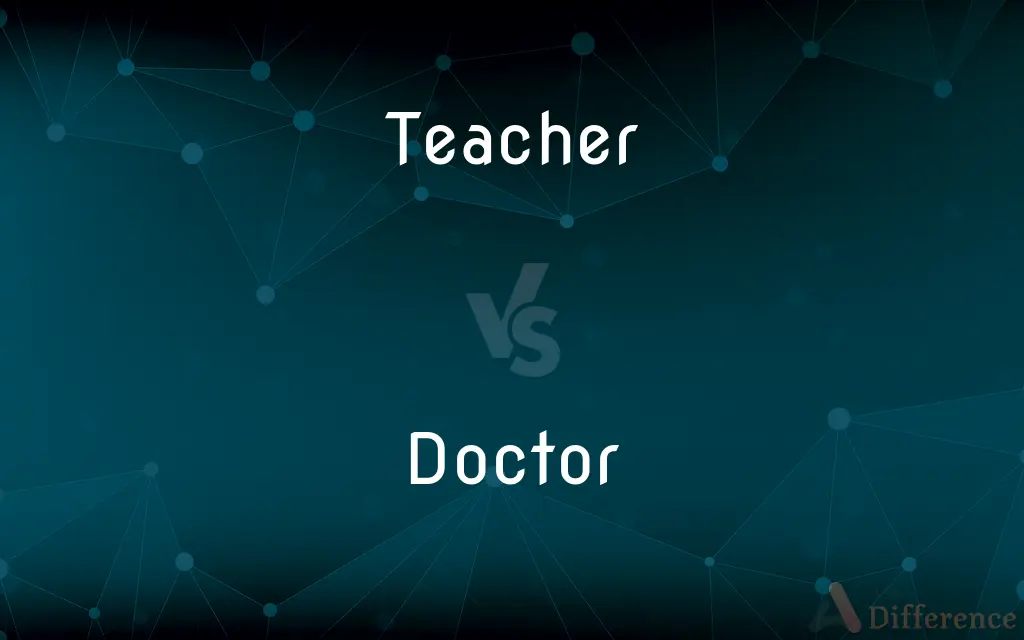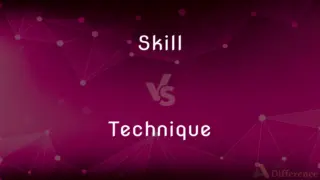Teacher vs. Doctor — What's the Difference?
By Tayyaba Rehman & Fiza Rafique — Updated on February 29, 2024
A teacher educates students on various subjects, fostering knowledge and skills, while a doctor diagnoses and treats illnesses, focusing on physical and mental health.

Difference Between Teacher and Doctor
Table of Contents
ADVERTISEMENT
Key Differences
A teacher's main role is to educate students, aiming to impart knowledge and develop skills across a wide range of subjects. Conversely, a doctor's primary responsibility is to diagnose, treat, and prevent illnesses, ensuring patients' physical and mental well-being.
Teachers typically work in schools, colleges, or educational institutions, creating lesson plans and teaching groups of students. Doctors, on the other hand, work in healthcare settings like hospitals, clinics, or private practices, where they see individual patients or conduct surgeries.
Both professions require extensive education, but their paths diverge significantly. Teachers need a degree in education or a specific subject area plus teaching credentials, while doctors must complete a medical degree followed by residency training in a specialized field.
Teachers shape the future by educating the next generation, influencing students' critical thinking, values, and career choices. Doctors directly affect individual lives, focusing on health, treatment, and recovery, contributing to the community's overall well-being.
Teachers continually adapt to new teaching methods and curriculum changes, often pursuing further education or certifications. Doctors must keep up with medical advancements, research, and evolving treatment protocols, requiring ongoing learning and recertification.
ADVERTISEMENT
Comparison Chart
Main Role
Educate and develop students' knowledge and skills.
Diagnose, treat, and prevent illnesses.
Work Environment
Schools, colleges, educational institutions.
Hospitals, clinics, private practices.
Education Required
Bachelor's degree in education or specific subjects, teaching credentials.
Medical degree, residency, possibly fellowship.
Key Skills
Communication, patience, creativity, empathy.
Analytical, detail-oriented, empathy, stress management.
Impact
Influences future generations, critical thinking, and values.
Directly affects health and well-being of individuals.
Compare with Definitions
Teacher
An educator who assesses student progress.
The teacher graded essays over the weekend.
Doctor
A provider of preventive healthcare advice.
The doctor advised regular exercise for better health.
Teacher
A role model within an educational setting.
As a teacher, Mr. Lee mentors students beyond academics.
Doctor
A surgeon who performs operations.
The doctor successfully completed the heart surgery.
Teacher
A person who imparts knowledge or instructs.
Mrs. Johnson, a math teacher, simplifies complex concepts for her students.
Doctor
A specialist in a particular field of medicine.
Dr. Smith, a pediatrician, focuses on children's health.
Teacher
A facilitator of discussions and critical thinking.
The history teacher encouraged debates in class.
Doctor
A person who is licensed to practice medicine and has trained at a school of medicine or a school of osteopathic medicine; a physician.
Teacher
A person who teaches, especially one employed in a school.
Doctor
A researcher in medical sciences.
The doctor published a paper on innovative cancer treatments.
Teacher
Someone who designs curriculum and lesson plans.
The science teacher updated the curriculum to include more experiments.
Doctor
Any of certain other healthcare professionals, such as a dentist, optometrist, chiropractor, podiatrist, or veterinarian.
Teacher
A teacher (also called a schoolteacher or formally, an educator) is a person who helps students to acquire knowledge, competence or virtue. Informally the role of teacher may be taken on by anyone (e.g.
Doctor
(dated) Any mechanical contrivance intended to remedy a difficulty or serve some purpose in an exigency.
The doctor of a calico-printing machine, which is a knife to remove superfluous colouring matter
The doctor, or auxiliary engine, also called "donkey engine"
Teacher
One who teaches, especially one hired to teach.
Doctor
(transitive) To act as a medical doctor to.
Her children doctored her back to health.
Teacher
A person whose occupation is teaching
Doctor
A person who holds Ph.D. degree from an academic institution;
She is a doctor of philosophy in physics
Teacher
A personified abstraction that teaches;
Books were his teachers
Experience is a demanding teacher
Doctor
A medical professional who diagnoses and treats illnesses.
The doctor prescribed medication for the infection.
Common Curiosities
What education is required to become a teacher?
A bachelor's degree in education or in a specific subject area, along with teaching credentials.
Where do doctors typically work?
In hospitals, clinics, or private medical practices.
How do teachers impact society?
They educate the next generation, influencing critical thinking, values, and career choices.
Where do teachers typically work?
In schools, colleges, or other educational institutions.
What is the main difference between a teacher and a doctor?
A teacher focuses on educating and developing skills, while a doctor diagnoses and treats illnesses.
What are some key skills for doctors?
Analytical skills, detail orientation, empathy, and stress management.
What kind of impact do doctors have on individual lives?
They play a crucial role in diagnosing, treating, and advising on health, directly affecting patients' quality of life.
Can teachers work in healthcare settings?
Not typically, unless they are providing education related to health.
What education is required to become a doctor?
A medical degree followed by residency training, and possibly fellowship for specialization.
How do doctors impact society?
By directly improving individuals' health, contributing to the community's well-being.
Is teaching or practicing medicine more stressful?
Stress levels can vary widely in both professions, depending on the work environment, individual resilience, and support systems.
What are some key skills for teachers?
Communication, patience, creativity, and empathy.
Do both professions require continuous education?
Yes, both must keep up with advancements in their fields.
Can doctors work in educational settings?
Yes, as instructors in medical schools or in health education.
What kind of impact do teachers have on individual lives?
They can significantly influence a student's career choice, values, and lifelong learning habits.
Share Your Discovery

Previous Comparison
Skill vs. Technique
Next Comparison
Text vs. ParagraphAuthor Spotlight
Written by
Tayyaba RehmanTayyaba Rehman is a distinguished writer, currently serving as a primary contributor to askdifference.com. As a researcher in semantics and etymology, Tayyaba's passion for the complexity of languages and their distinctions has found a perfect home on the platform. Tayyaba delves into the intricacies of language, distinguishing between commonly confused words and phrases, thereby providing clarity for readers worldwide.
Co-written by
Fiza RafiqueFiza Rafique is a skilled content writer at AskDifference.com, where she meticulously refines and enhances written pieces. Drawing from her vast editorial expertise, Fiza ensures clarity, accuracy, and precision in every article. Passionate about language, she continually seeks to elevate the quality of content for readers worldwide.
















































